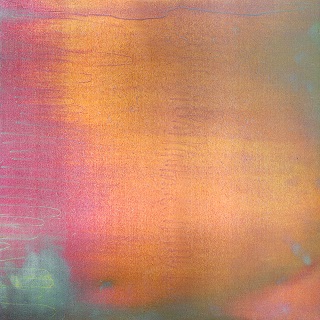
"Bizarre Love Triangle" is a song by English rock band New Order, released as a single in November 1986 from their fourth studio album, Brotherhood (1986), which reached the top five on the US Hot Dance Music/Club Play Singles chart, and No. 5 on the Australian ARIA Charts in March 1987.

"Computer Games" is a song by New Zealand band Mi-Sex, released in September 1979 in Australia and New Zealand as the second single from their debut studio album, Graffiti Crimes (1979). The song peaked at number 1 in Australia and 5 in New Zealand. The music video was filmed on location at what was at the time Control Data Corporation's North Sydney centre and included gameplay from the 1979 arcade games Speed Freak, Basketball and Star Fire. The single won the award for Best Australian Single at the 1979 TV Week/Countdown Music Awards.
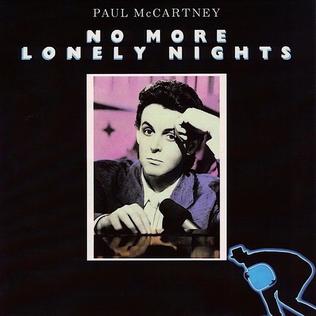
"No More Lonely Nights" is a song written and performed by Paul McCartney, first released on 24 September 1984 on the soundtrack Give My Regards to Broad Street (1984).
Wa Wa Nee was a 1980s Australian funk band.

"Electric Blue" is a song by the Australian rock / synthpop band Icehouse. It was co-written by Iva Davies of Icehouse and John Oates of the U.S. band Hall & Oates. Oates became involved with Davies after contacting him to state he was a fan. The resulting collaboration produced this song and Oates has stated that if Davies had not released the song under the Icehouse name then it would have been a Hall and Oates track.
"When You Walk in the Room" is a song written and recorded by Jackie DeShannon. It was initially released as a single on November 23, 1963, as the B-side to "Till You Say You'll Be Mine". It was re-released as an A-side in September 1964, and later included on the album Breakin' It Up on the Beatles Tour. The single charted on the US Billboard Hot 100, peaking at number 99.

"Right by Your Side" is a song by the British pop duo Eurythmics. It was written by group members Annie Lennox and David A. Stewart, and produced by Stewart. The track was released as the second single in the UK from Eurythmics' third album Touch.
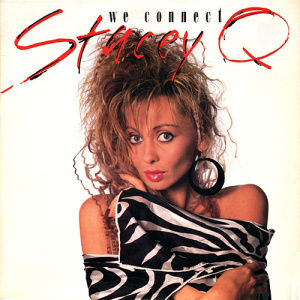
"We Connect" is a song recorded by American singer Stacey Q for her debut studio album Better Than Heaven (1986). Written by Willie Wilcox and produced by Jon St. James and Wilcox, the song was the follow-up to her hit single "Two of Hearts".

"Mad About You" is the debut solo single by American singer Belinda Carlisle. It was written by Paula Jean Brown, James Whelan and Mitchel Young Evans, and produced by Michael Lloyd for Carlisle's debut solo album Belinda. The single was released in 1986 as a CD single, 7-inch single and a 12-inch single. It was her first hit after leaving the Go-Go's, peaking at number three on the U.S. Billboard Hot 100 and at number one on the Canadian Singles Chart.

"He's Gonna Step on You Again" is a song originally performed by John Kongos, co-written by Kongos and Christos Demetriou, and first released in 1971 by Fly Records. It entered the UK Singles Chart on 22 May 1971 and spent 14 weeks there, peaking at No. 4. Covers of the song have been chart successes several times, including for Happy Mondays in 1990.

"Wishing Well" is a song recorded by Terence Trent D'Arby. The second single from the 1987 album Introducing the Hardline According to Terence Trent D'Arby, the song reached number one on both the Soul Singles Chart and the Billboard Hot 100 on May 7, 1988. "Wishing Well" was certified "Gold", indicating sales of 500,000, by the Recording Industry Association of America in October 1991. Written by D'Arby and Sean Oliver, D'Arby said "Wishing Well" was written "when I was in a half-asleep, half-awake state of mind", and that he "liked the feel of the words". Martyn Ware of Heaven 17 paired with D'Arby in production of the song, which was released on CBS Records. Once released, "Wishing Well", along with D'Arby's debut single "If You Let Me Stay", went into "heavy rotation" on MTV. D'Arby performed the song live at the 30th Annual Grammy Awards, where he lost the Grammy Award for Best New Artist to Jody Watley. When the single reached number one on the Billboard Hot 100, it had charted for 17 weeks, the longest progress to number one in the US charts since Eurythmics' "Sweet Dreams " in 1983.

"Too Much Ain't Enough Love" is a song by Australian rock singer, Jimmy Barnes. It was released in October 1987 as the first single from Barnes' 1987 album, Freight Train Heart It was his first Australian No. 1 hit single, while reaching No. 4 on the New Zealand Singles Chart. In the United States it was issued in the following year, which peaked at No. 91 on the Billboard Hot 100 in July 1988. It featured back-up vocals by Venetta Fields, as well as Wendy Matthews, who later found acclaim as a solo singer.

"Let's Go!" is a single by English new wave band Wang Chung, released on 6 January 1987 from their fourth studio album, Mosaic (1986). The single was a hit for the band in the United States, where it provided them with their second and last Top 10 hit on the Billboard Hot 100 in April 1987, peaking at No. 9. The single also formed the basis for its official music video. It also hit No. 9 on the Canada RPM Top 100 Singles chart.

"No Promises" is a song by Australian band Icehouse, released in October 1985, as the first single issued from the band's 1986 album, Measure for Measure. The single was released in Australia through Regular Records, on 7", 12" and maxi-cassette single formats. Chrysalis Records issued the single in the UK and Europe on 7" and 12" formats, with different track listings. "No Promises" was subsequently released in the US by Chrysalis on 7" and 12" formats, again with different track listings. The single peaked at #30 on the Australian singles chart in February 1986. A remixed version by (Love) Tattoo was included on the Icehouse remix album Meltdown in 2002. Two music videos were filmed to promote the single; the second of these was directed by Dieter Trattmann.

"Crazy" is a song by the Australian rock/synthpop band Icehouse, from the Man of Colours album, the single peaked at Number 4 on the Australian Kent Music Report. The song was written by band members Iva Davies, Robert Kretschmer and Andy Qunta, and produced by David Lord.
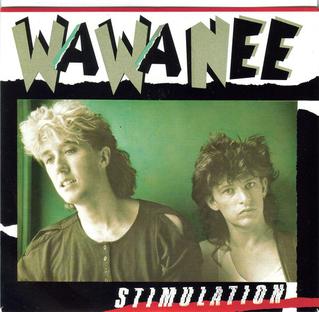
"Stimulation" is the debut single from Australian pop group Wa Wa Nee. The song was released in April 1986 as the lead single from their self-titled debut studio album. The song peaked at number 2 on the Australian singles chart.

"I Could Make You Love Me" is a song from Australian pop group Wa Wa Nee. The song was released in August 1986 as the second single from their self-titled debut studio album. The song peaked at number 5 on the Australian singles chart.

"So Good" is a song from Australian pop group Wa Wa Nee. The song was released in February 1989 as the second single from their second studio album, Blush (1989). The song peaked at number 36 on the Australian ARIA Charts.

Wa Wa Nee is the debut studio album by Australian pop group Wa Wa Nee. Wa Wa Nee peaked at No. 29 in Australia and was certified platinum.
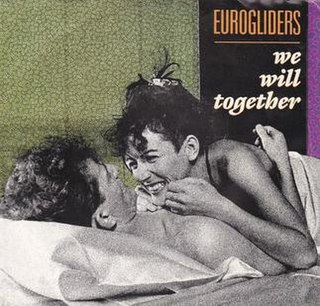
"We Will Together" is a song by Eurogliders, released in April 1985 as the lead single from their third studio album, Absolutely! (1985). The song peaked at number 7 on the Australian Kent Music Report.


















